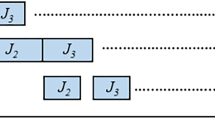Abstract
We consider the following offline variant of the speed scaling problem introduced by Yao et al. We are given a set of jobs and we have a variable-speed processor to process them. The higher the processor speed, the higher the energy consumption. Each job is associated with its own release time, deadline, and processing volume. The objective is to find a feasible schedule that minimizes the energy consumption. In contrast to Yao et al., no preemption of jobs is allowed. Unlike the preemptive version that is known to be in P, the non-preemptive version of speed scaling is strongly NP-hard. In this work, we present a constant factor approximation algorithm for it. The main technical idea is to transform the problem into the unrelated machine scheduling problem with \(L_p\)-norm objective.




Similar content being viewed by others
References
Albers, S. (2010). Energy-efficient algorithms. Communications of the ACM, 53(5), 86–96.
Azar, Y., & Epstein, A. (2005). Convex programming for scheduling unrelated parallel machines. In Proceedings of the 37th Annual ACM Symposium on Theory of Computing (pp. 331–337).
Bansal, N., Kimbrel, T., & Pruhs, K. (2007). Speed scaling to manage energy and temperature. Journal of the ACM, 54, 1–3.
Bartal, Y., Leonardi, S., Shallom, G., & Sitters, R. (2006). On the value of preemption in scheduling. In Approximation, randomization (pp. 39–48). Springer.
Bampis, E., Letsios, D., Milis, I., & Zois, G. (2012). Speed scaling for maximum lateness. COCOON, 25–36.
Bampis, E., Lucarelli, G., & Nemparis, I. (2012). Improved approximation algorithms for the non-preemptive speed-scaling problem. In arXiv, CoRR abs/1209.6481.
Braun, O., & Schmid, G. (2003). Parallel processor scheduling with limited number of preemptions. SIAM Journal on Computing, 32, 671–680.
Chen, J. J., Kuo, T. W., & Lu, H. I. (2005). Power-saving scheduling for weakly dynamic voltage scaling devices. In WADS (pp. 338–349). Springer.
Chuzhoy, J., & Codenotti, P. (2009). Resource minimization job scheduling. In APPROX-RANDOM (pp. 70–83). Springer.
Chuzhoy, J., Ostrovsky, R., & Rabani, Y. (2006). Approximation algorithms for the job interval selection problem and related scheduling problems. Mathematics of Operations Research, 31(4), 730–738.
Dimpsey, R. T., & Iyer, R. K. (1990). Performance degradation due to multiprogramming and system overheads in real workloads: Case study on a shared memory multiprocessor. In International Conference on Supercomputing (pp. 227–238).
Etsion, Y., Tsafrir, D., & Feitelson, D. G. (1990). Effects of clock resolution on the scheduling of interactive and soft real-time processes. In SIGMETRICS (pp. 172–183).
Garey, M. R., & Johnson, D. S. (1979). Computers and intractability: a guide to the theory of NP-Completeness. San Francisco: W. H. Freeman.
Natarajan, C., Sharma, S., & Iyer, R. K. (1994). Measurement-based characterization of global memory and network connection, operating system and parallelization overheads: Case study on a shared memory multiprocessor. Annual International Symposium on Computer Architecture, 21, 71–80.
Li, M., Liu, B. J., & Yao, F. F. (2006). Min-energy voltage allocation for tree-structured tasks. Journal of Combinatorial Optimization, 11, 305–319.
Li, M., & Yao, F. F. (2005). An efficient algorithm for computing optimal discrete voltage schedules. SIAM Journal on Computing, 35, 658–671.
Yao, F. F., Demers, A. J., & Shenker, S. (1995). A scheduling model for reduced CPU energy. In Proceedings of the 36th Annual Symposium on Foundations of Computer Science (pp. 374–382).
Author information
Authors and Affiliations
Corresponding author
Rights and permissions
About this article
Cite this article
Antoniadis, A., Huang, CC. Non-preemptive speed scaling. J Sched 16, 385–394 (2013). https://doi.org/10.1007/s10951-013-0312-6
Received:
Accepted:
Published:
Issue Date:
DOI: https://doi.org/10.1007/s10951-013-0312-6




